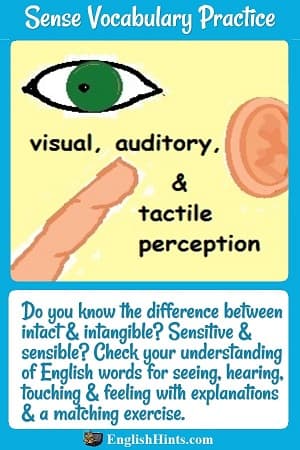Exercise Your Sense
Vocabulary
with this Matching Game
Much of our English ‘sense vocabulary’ comes from Latin roots (via French).
(Our most common words-- seeing, hearing, smelling,
tasting, etc.-- have Anglo-Saxon roots. Still, we use so many more with Latin roots!)
Take a look at these lists of Latin-based words. Then see how many you know or can guess in the interactive matching game below.
(As an example, to be circumspect is to be cautious and avoid risks-- to 'look all around' before acting.)
If you prefer to do the matching from a pdf offline, right click here, then choose 'save as...' to download it.
Videre-- to See
Evidence, evidently, improvident, improvise, invisible, provide, providence, provision, review, revise, revision, supervise, supervision, supervisor, supervisory, video, view, visible, visibility, visibly, vision, visionary, visual, visualize, visualization, visually.
(View and review originally come from videre but were altered more by French than some of the other words.)
Spectare -- to Watch (from Specere-- to look at)
Aspect, circumspect, inspect, inspection, inspector, perspective, prospect, prospective, prospector, spectacle, spectacles, spectacular, spectacularly, spectator, suspect, suspicion, suspicious.
Audire-- to Hear
Audible, audience, audio, audiology, audition, auditorium, auditory, inaudible.
Tangere-- to Touch; Tactus-- Touched
Attain, attainable, contact, intact, intangible, tactile, tangible, unattainable.
(Intact and intangible are both negatives, but 'intact' means untouched-- undamaged. Intangible means something we cannot 'touch' with the senses. It's something that is not physical, but intellectual, moral, spiritual, etc.
Sentire-- to Feel, Perceive, Know,
& Sensus-- Feeling, Perception

‘To sense’ is to ‘feel’ in the sense of 'to recognize the presence of’ something. (“I sense a change in the atmosphere.”) As a noun, a ‘sense’ refers to one of the five senses, as in “my sense of smell is weak.”
‘Sense’ may also mean ‘meaning’ (see the first sentence of this paragraph), or ‘good judgment’ (‘common sense.’)
Common related words: insensitive, sense, sensation, sensational, sensibility, sensible, sensitive, sensitivity, sensor, sensory, sensual, sensuality, unsensational.
Sensible originally meant capable of feeling. Over time the meaning changed to ‘reasonable’, even ‘wise.' It is now a false cognate of the Spanish ‘sensible,’ which has kept the original meaning of ‘sensitive’ or ‘perceptive.’
‘Sensibility’ has also kept that meaning. So has 'insensible,' which means unconscious, unaware, or even incapable of sensation.
So someone who is sensitive reacts easily or strongly to what she or he feels or senses. Such a person may be easily hurt or easily moved by the suffering of others. A sensible person usually doesn't react as quickly.
A Note About Prefixes
Notice the prefixes ‘in’ and ‘un’ in this sense vocabulary. ‘In’ can mean into/inside/within. That’s its meaning in ‘inspect’ (to look into), ‘incline’ (to lean in toward something) or ‘inherent’ (to be inside something, a basic part of its nature.)
More commonly as a prefix ‘in’ (or ‘im’ before an ‘m’ or a ‘p’) means ‘not.’ Improvident means not careful to provide for the future. To improvise is to make adjustments for unforeseen, unexpected events.
Other words using 'in to mean not are inaudible, insensitive, intact (untouched or undamaged), intangible, and invisible.
‘Un’ also means ‘not.’ It has Anglo-Saxon roots rather than Latin. It is also used with words from Latin roots like the two above.
Most words have a preferred prefix, and you need to learn them to sound right to native speakers. So we say ‘unattainable’ or ‘unspectacular’ (or unexpected and unforeseen). We don't say ‘inattainable.’ (My spell-checker red-lined that!) etc. We also never say ‘unvisible.’
Only a few words can use either. (If in doubt, use your dictionary.)
Match English Sense Vocabulary with its Meaning
Match the words on the right to the sentences on the left. The first one is done for you.
Home> Roots, Prefixes, and Suffixes> Sense Vocabulary.
Didn't find what you
needed? Explain what you want in the search box below.
(For example, cognates, past tense practice, or 'get along with.') Click to see the related pages on EnglishHints.
| site search by freefind | advanced |








